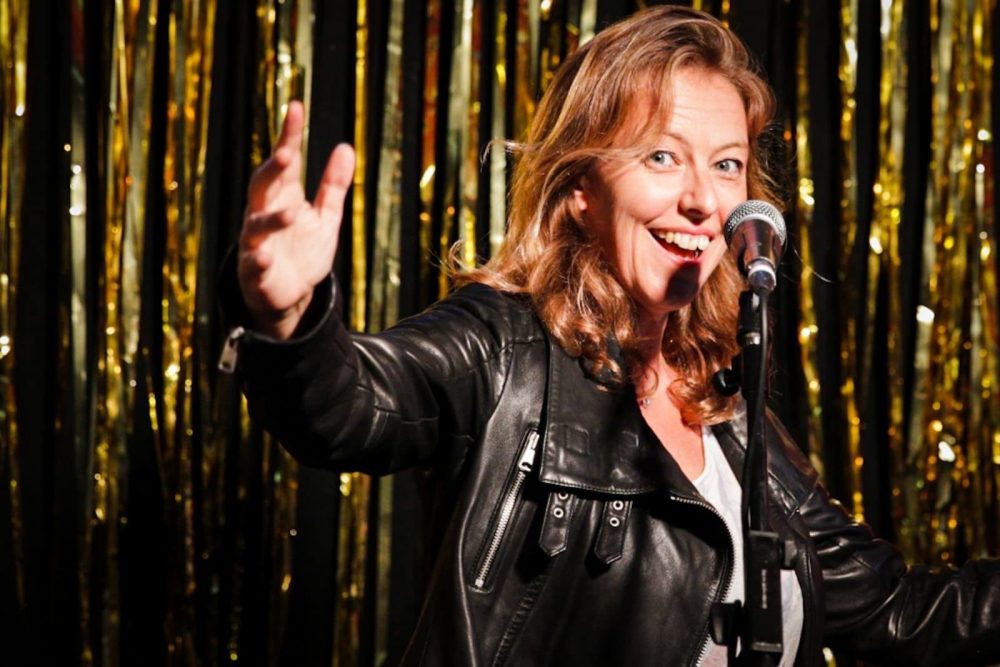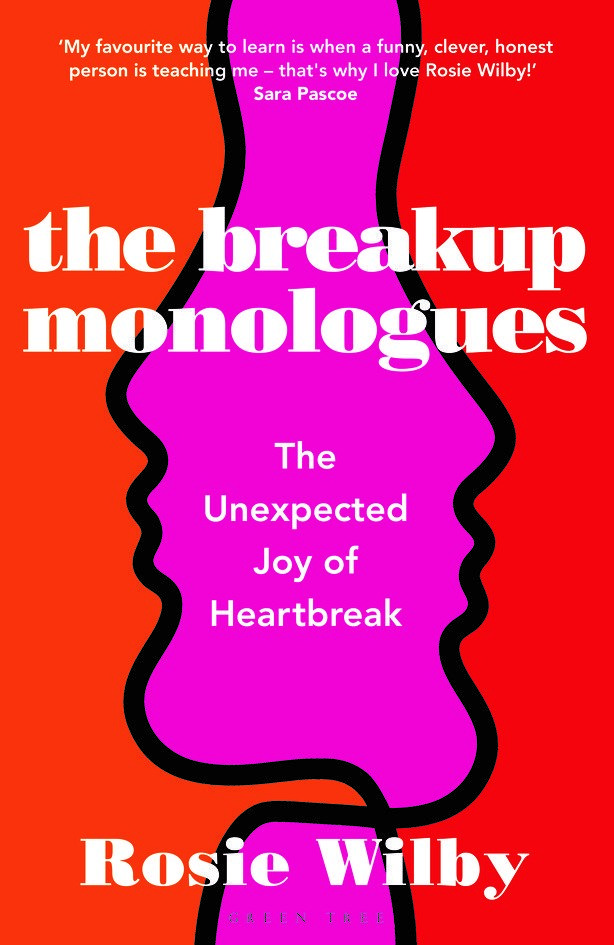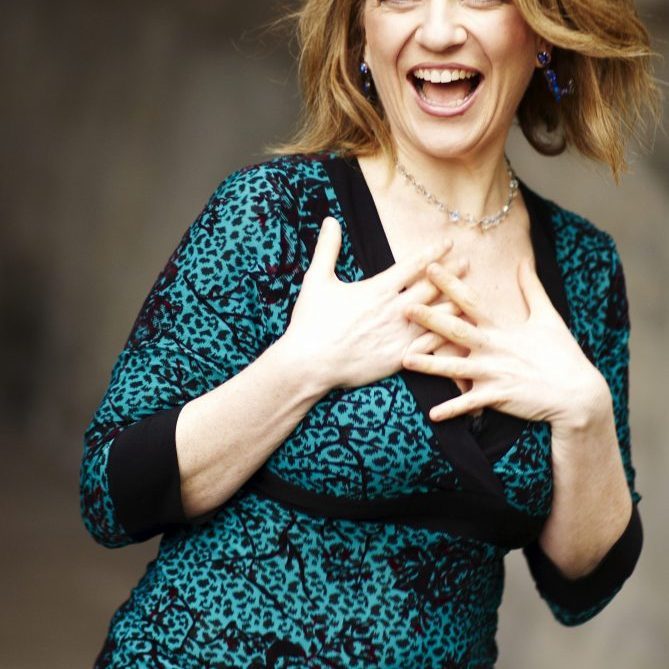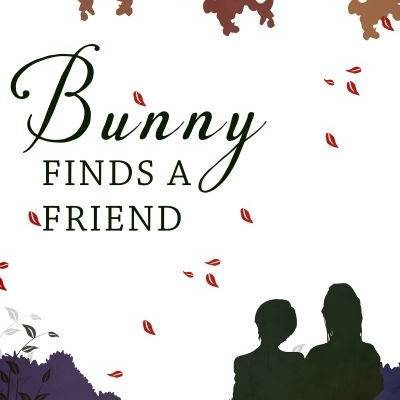
Author and journalist Lucy O’Brien interviews award-winning U.K. comedian Rosie Wilby about her new book The Breakup Monologues, based on her podcast of the same name, which looks at heartbreak and love through an inclusive lens.
What inspired The Breakup Monologues podcast?
The Breakup Monologues podcast was inspired by a trilogy of comedy shows investigating the psychology of love and relationships that I have toured around the world over the last decade or so. The trilogy began with a show called The Science of Sex, which was a sort of spoof sex education lesson, and ended with a show called The Conscious Uncoupling, which was all about my most painful breakup. After the show, friends and fellow performers would chat to me about their own breakup stories. So I decided to start a live chat show where I compared notes with my guests about how we had recovered from heartbreak and the more bizarre things we had done in failed attempts to woo partners back. I was working on the age old premise that tragedy plus time equals comedy. When the live shows started getting a great response, I decided we should record them for release as a podcast.
How did you go about turning it into a book?
I always had the idea of writing a book in the back of my mind because I’d already written one called Is Monogamy Dead? That was based on the middle part of my comedy trilogy. So I sort of already had a template for combining accessible science with funny memoir in loosely alternating chapters. With The Breakup Monologues, I had another element to add in because I wanted to include some of the most insightful and memorable stories, comments and ideas that had come up in the podcast recordings. So the early drafts rotated through three distinct types of chapter. In the end these elements were a bit more blended throughout.
Is it true that there’s an Australian connection to the breakup that first inspired the podcast?
Haha yes that is true. My aforementioned show The Conscious Uncoupling was all about my breakup with a woman who had, before meeting me, lived for a while in Sydney. When we travelled to Australia together for me to perform some shows, we decided to stay with her ex. It was really fun for the first week or so. I genuinely liked her ex. But then… things got complicated. There was clearly some unfinished business between the two of them. And I didn’t handle that well. So when we were back in the U.K., I was abruptly dumped by email. I have subsequently joked onstage that I felt much better once I’d corrected her spelling and punctuation… and changed the font.
Why do you say at the start of the book, ‘if you really want to know about breakups… you should ask a lesbian’?
Statistics from all over the world seem to suggest that lesbians have a relatively high divorce rate. I’ve also noticed in my own community that queer women tend towards serial monogamy and we often each have quite a long list of ex-girlfriends (to the extent that I joked once that at my wedding I’d like to be ‘given away’ by a procession of ex-lovers rather than by my father. Surely that’s the real handover that’s taking place!). This relatively rapid rate of serial monogamy isn’t necessarily a bad thing, however… because queer women are also known for separating amicably and staying friends with our exes.
Do you think lesbians stay friends with ex-partners more frequently than anyone else?
Definitely! I think we pioneered amicable breakups long before ‘conscious uncoupling’ became a thing. This was probably because, in past decades, the lesbian community was small and you had to stay friends with your ex… because there might not be anyone else to be friends with! Seriously, though, it’s incredibly inspiring to see the strong bonds that older women I know have with their former partners. When you’ve shared that history with someone, it’s a precious thing. Especially when you’ve had to fight prejudice together and fight for your rights and visibility as a couple.
There’s a lot of scientific research underpinning the personal journey you describe in the book. Was there anything you learned that surprised you?
There’s a chapter where I interview a ‘neuroethicist’ about how we might be able to take a pill in the near future that would help us to forget an ex or a painful breakup. It would be like a real-life version of the film Eternal Sunshine of the Spotless Mind. That really blew my mind!
I have also been frustrated at reading so many psychology books about love and finding just what a heteronormative stance they all take. The nuances of queer relationships are often ignored. So I’ve tried to turn that on its head in my work and look at what we might learn from studying queer partnerships.
 How have people in the U.K. responded to The Breakup Monologues so far?
How have people in the U.K. responded to The Breakup Monologues so far?
The reviews have been great here so far, which has been lovely. So many people have told me that they’ve found the book reassuring and that it had made them feel less alone. Some of them have also enjoyed the breakup playlist suggestions at the centre of the book and have listened to all the songs.
And lots and lots of women have responded to the chapter about friendship breakups, which contains some great advice from Australian author and journalist Kate Leaver. We don’t have any recognised social scripts for getting over friendship breakups. So we can feel particularly alone when we experience them. But we should still allow ourselves time and space for recovering from the loss of an important connection.
What does your partner, ‘Girlfriend’ as you call her, think of the book?
Poor Girlfriend! She’s been so incredibly patient about having details of our relationship revealed all over the world – although there were of course plenty of discussions about the things that were definitely off-limits.
The ‘happy ending’ is that we are engaged to be married. So I believe that this is proof of my central thesis of the book – that our breakups are learning experiences that ultimately equip us to make better choices and work out how to stay in a relationship when a better one comes along.
What is next for you?
Aside from getting married, I will be releasing further episodes of The Breakup Monologues podcast. Now we are, thankfully, out of lockdown in the U.K., I’m able to go and record live episodes at festivals this summer. I’m really looking forward to it after everything was cancelled last year. I certainly hope to write more books in the future too.
The Breakup Monologues is published by Bloomsbury in Australia and New Zealand on August 3.


